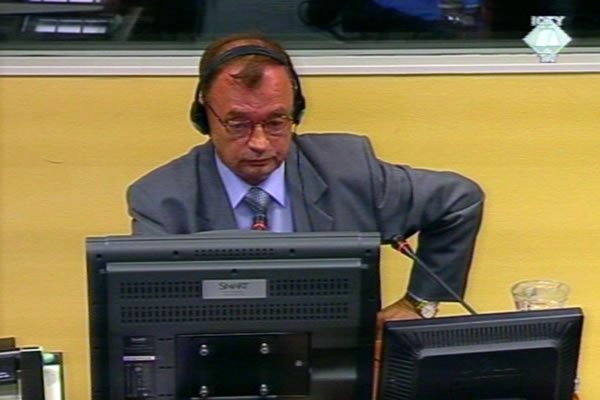Home
DEFENSE: STANISIC DEFENDED SERBIA AGAINST ORIC’S ‘ARMED CIVILIANS’
Defense counsel Jordash picked up on General Manojlo Milovanovic’s claim that in 1993 Jovica Stanisic was well informed about the situation in the Podrinje area in Bosnia. According to Jordash, this didn’t show that his client was interested in the war in BH, but his endeavor to defend the Serbian border against frequent attacks by Naser Oric and his ‘armed civilians’
 Manojlo Milovanovic, witness at the Jovica Stanisic and Franko Simatovic trial
Manojlo Milovanovic, witness at the Jovica Stanisic and Franko Simatovic trial The examination-in chief of the former chief of the VRS Main Staff Manojlo Milovanovic continued today. It was completed after the judges checked the ‘homework’ the prosecution had set the witness: he was asked to review 64 documents over the weekend and evaluate their authenticity. The documents are reports of the VRS military intelligence service drafted in 1993 and 1994 and signed by head of that body, Zdravko Tolimir, and his assistants Ljubisa Beara and Petar Salapura. Chief of the Serbian police State Security Jovica Stanisic was among recipients of the documents.
Milovanovic said that in his view all but one of the 64 documents were authentic. This could favor the prosecution case: it is trying to prove that Stanisic received reports on the events in the field at the time when crimes against non-Serbs were perpetrated in Croatia and BH. Stanisic and his deputy Franko Simatovic are on trial for those crimes. However, the witness appended a short letter to the documents he gave back to the prosecutor today. In the letter, Milovanovic explained the context in which Tolimir’s reports reached Stanisic.
In the additional information, Milovanovic noted the purportedly ‘usual practice whereby friendly countries in the region exchanged intelligence’; Milovanovic considers Serbia, Republika Srpska and Republika Srpska Krajina as ‘friendly countries’ here. Nevertheless, Milovanovic claims that information was exchanged only at the level of military intelligence services. Colonel Tolimir listed Jovica Stanisic and other high-ranking Serb officials as recipients of his reports in an effort to aggrandize himself and show that he was ‘communicating with important persons’. Tolimir thus overstepped his powers. ‘I would like to stress that Tolimir’s intelligence does not constitute evidence for or against Jovica Stanisic; it is merely an additional burden on the Tribunal’s administration with more paperwork’, Milovanovic concluded in his letter, in a way trying to do the judges’ work.
Defense counsel Jordash was obviously pleased with Milovanovic’s explanation of the way in which Stanisic was kept in the loop by the VRS intelligence service in 1993 and 1994. In his cross-examination, Jordash tried to show that his client did not receive any reports from the battlefield, either before or after that period. He showed the witness Tolimir’s report on the activities of the paramilitary units in BH in 1992; Stanisic was not among the recipients of the report. The witness replied that at the time he himself did not receive military intelligence reports and therefore could not tell who else got them.
In his examination-in chief last week, Milovanovic said that when he first met Stanisic in January 1993 by the Tara river, he was ‘amazed’ at how well Stanisic knew the military situation in the Podrinje area in Bosnia. This led the defense counsel to suggest that the state security service in fact had to get involved in the defense of the Serbian territory because Naser Oric’s units were a clear and present danger. Oric’s troops were purportedly attacking Serb villages on both the Bosnian and Serbian banks of the Drina river. Milovanovic mostly tried hard to confirm the defense arguments, but had to admit that it was not an organized army but ‘armed groups of civilians’ under Oric’s command.
Continuing his examination, the defense lawyer denied that Stanisic had any authority over Zeljko Raznatovic Arkan’s unit. Jordash put it to the witness that in September 1995, ‘Arkan’s men’ were invited to come to the Kljuc area by the Bosnian Serb president Radovan Karadzic. ‘Arkan told me he had been summoned by our supreme commander’, Milovanovic said, adding that Arkan claimed there was a written order to that effect, although he never produced it. At that time, the witness asked Karadzic at a meeting if he had indeed invited Arkan to come to Bosnia. Karadzic ‘remained silent’: he neither confirmed it nor denied it.
The cross-examination of the witness continues tomorrow.
Linked Reports
- Case : Stanisic & Simatovic
- 2010-04-23 PUBLIC TESTIMONY ABOUT SECRET DOCUMENTS
- 2010-04-13 VIDEO EVIDENCE OF THE SPECIAL FORCES TRAINING IN BARANJA
- 2010-04-12 ‘SPECIAL’ OPERATIONS OF STATE SECURITY UNITS IN BARANJA
- 2010-04-29 STANISIC ‘ONLY’ CONVEYED ORDERS FROM THE TOP BRASS
- 2010-05-12 STANISIC IN KNIN, ‘FRENKI’S MEN’ IN BARANJA
- 2010-05-13 DID THE WITNESS ‘SEE’ STANISIC IN KNIN OR JUST ‘HEARD’ OF HIS PRESENCE
